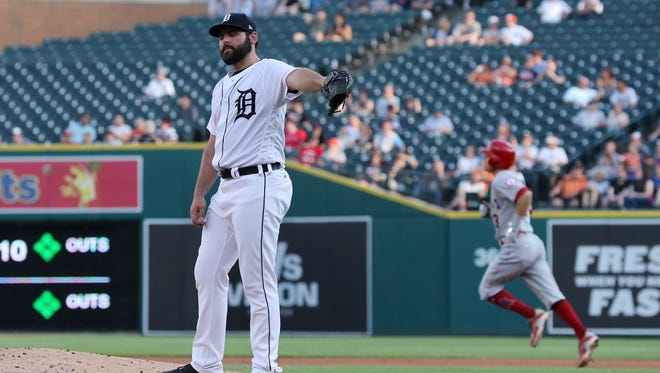Tigers suffer fourth-biggest attendance decline in MLB
 Tony Paul
Tony Paul
The Detroit Tigers, certainly, are in full rebuild mode.
But there's one thing they won't soon have to upgrade — the turnstiles at Comerica Park. They didn't get much use this year.
The Tigers saw a significant drop in attendance in 2018, down nearly a half-million fans from the 2017 season. The drop of 464,629 was the fourth-steepest decline in all of Major League Baseball.
The Tigers, who finished the season 64-98 — fifth-worst in baseball — averaged 23,212 fans for their 81 home games, in the bottom third of MLB teams. That included 80 gates, as there was one traditional doubleheader.
Their total attendance of 1,856,970 was their lowest since 2003; that was the year they lost an American League-record 119 games.
Detroit only boasted one sellout this season, on Opening Day, and even that is up for debate, given there were plenty of tickets available right up until first pitch.
Official attendance for that game was 42,816. The Tigers never again drew 35,000. They drew 34,674 on June 2 against the Blue Jays — much of the crowd was from Toronto — and 34,036 on Aug. 26 against the White Sox on the day they retired Alan Trammell's No. 3. They drew 30,105 on Aug. 12 against the Twins on the day they retired Jack Morris' No. 47.
The Tigers only topped 30,000 once during the three-day weekend in September when they honored the 1968 World Series-champion Tigers, and that was on the Saturday, when 20,000 fans received a free replica road jersey.

According to statista.com, the Tigers' average ticket price in 2018 was $28.15, meaning they made more than $50 million in ticket revenue. According to Baseball Prospectus, their Opening Day payroll was $125.3 million, down from nearly $200 million in 2017. The Tigers, of course, have many more sources of revenue, including from their TV rights deal with Fox Sports Detroit, which is believed to net them $50 million per year.
The Tigers, in 2017, traded away several big-name players, including Justin Verlander and J.D. Martinez, and the fire sale continued in the offseason with Ian Kinsler leaving. That significantly dampened enthusiasm heading into the 2018 season, as general manager Al Avila was honest about the team's long-term rebuild plans. The Tigers, previously big players on the open market, signed no marquee free agents.
Miguel Cabrera missing most of the season with an injury played a role in the overall numbers, too.
The lowest-attended non-doubleheader home game this season was Tuesday, April 3, when 15,083 showed up for a game against the Royals. That means the season-ticket base was almost certainly below 15,000, from a high of well over 20,000 during the Tigers' run of four consecutive playoff appearances from 2011-14.
Two days earlier, 14,858 attended the first game of a doubleheader against the Pirates. That was the second game of the season, which during the heyday often would come close to selling out, because so many fans got shut out of Opening Day. That was the Tigers' lowest announced attendance since 2006.
This marks the fifth consecutive year Tigers attendance has declined.
Attendance was down 4 percent league-wide to 28,830, MLB's lowest average since 2003. Six stadiums set record lows, including two in the American League Central, Chicago's Guaranteed Rate Field and Minnesota's Target Field.
Weather played some factor, especially early in the year. There were 28 postponements in April, and 54 overall.
tpaul@detroitnews.com
Twitter: @tonypaul1984